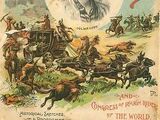Template:IndexTrope For the actual history of Hollywood, click here.
In the real world, each era of time throughout history has its own distinctive style and zeitgeist, based on what came before it. It also leaves an indelible mark in all of the eras that come after it. In this way, all periods of history are inextricably linked, and in order to thoroughly comprehend one, one must endeavor to study and understand them all.
Obviously, things get pumped up for movies. Whether or not you believe this is an Acceptable Break From Reality or THE WORST THING TO EVER HAPPEN EVER depends on the viewer, not to mention the restraints of time/watch-ability of an event (most filmgoers won't be impressed with a slow, boring event, however world-changing - and this isn't the Lowest Common Denominator we're talking about - many films have been blasted for this), invoking Rule of Drama and so on. This isn't restricted to film - ancient plays and literature have been doing this on and on.
It should be noted that popular entertainments, whether TV, film or print literature, are products of their times and cater to an audience of that time; thus, they will always bear more resemblance to the society that produces them than to the actual period. For instance, Happy Days, set in the 1950s, looks far more like the 1970s, the decade when it was produced, than does That 70s Show, produced in the early 2000s. Even Homer's Illiad depicts homoeroticism among the Acheans because that was what was expected of manly figures in his day, despite that it probably wasn't as big a fad at the time of the Trojan War. It's also why speculative fiction has such widely varying pictures of "The Future", and why The Jetsons portrays a future of technological marvels, but still assumes the push-button kitchen of tomorrow will be presided over by an apron-wearing housewife; it was beyond comprehension that automation in the home would result in women having lives outside it.
Note that many of these apply to Europe and the United States. Feel free to add the historical eras of other regions.
The most well-known eras of Hollywood History are as follows:
- The Dark Times. A time before the rise of mankind, with the world ruled by dark forces.
- One Million BC
- First Australians (Indigenous Australians)
- The Time of Myths. The setting for tales of a distant past, real or imagined. When gods, demons, and monsters walk the earth. Inspired by actual Oral Tradition or modern takes on it.
- Sword and Sandal. Setting covering Mythological tales, Biblical Epics, Ancient Greece, and Ancient Rome in film.
- Bible Times
- Ancient Egypt
- Ancient Greece
- The Trojan War (approximately 1194-1184 BC)
- Greco Persian Wars (499-449 BC). From the Ionian Revolt to the end of the Wars of the Delian League.
- Peloponnesian War (431-404 BC)
- Macedonian Succession Wars (323/322-272 BC). From the death of Alexander the Great to the start of a stable period under the Antogonid dynasty in Macedon. The rest of the Hellenistic kingdoms were more-or-less stable.
- Maccabean Revolt (167/166-129 BC)
- Ancient Rome (753 BC-476 AD)
- The Roman Republic (c. 509 -27 BC)
- Punic Wars (264-241 BC, 218-201 BC, 149-146 BC)
- The Roman Empire (27 BC -476/480/1453)
- Jewish Revolts (66-73, 115-117, 132-136)
- Byzantine Empire (330-1453).
- The Roman Republic (c. 509 -27 BC)
- Ancient Grome (an amalgamation of the two above)
- Imperial China
- Dynasties From Shang to Qing (Pre-1912)
- Wuxia
- Medieval Japan
- Darkest Africa
- Mayincatec
- The Middle Ages (Fall of Rome to Discovery of America)
- Medieval Morons
- The Dung Ages
- The Low Middle Ages (c. 400-1050 AD)
- Dark Age Europe (c 400-600 AD)
- Anglo Saxons (c. 449-1066)
- L Etat Cest Moi. Full list and brief introduction of all French monarchs (c. 481-1792, 1804-1848, 1852-1870).
- Papal States (754-1870)
- Horny Vikings (c. 787-1066)
- Holy Roman Empire (800/962-1806)
- Kievan Rus and successors (c. 864-1547)
- The High Middle Ages (c. 1050-1320 AD)
- The House of Normandy (1066-1154)
- The Crusades (1095/1096-1291). Subsequent Crusades were actually called, but fought far from the Holy Land.
- The Knights Hospitallers (c. 1099-1798). Also known as Knights of Cyprus, Knights of Rhodes, and Knights of Malta. Based on the location of their headquarters at various points.
- The Knights Templar (c. 1119-1307/1314)
- The House of Plantagenet (1154-1485)
- The Teutonic Knights (c. 1190-1525)
- Hanseatic League (c. 1241-1669)
- The Habsburg Empire (Holy Roman Empire 1273-1291, 1298-1308, 1314-1330, 1438-1740, 1745-1806, Austrian Empire/Austria-Hungary 1804-1918)
- The Late Middle Ages (c. 1320-1500 AD)
- Hundred Years War (1337-1453)
- The House of Stuart (1371/1603-1714).
- Fall of Constantinople (1453)
- Wars of the Roses (1455-1487)
- The House of Tudor (1485-1603)
- Arabian Nights Days (700-1000 AD)
- The Renaissance (c. 1400-1600 AD)
- The Spanish Inquisition (1478/1480-1834)
- Italian Wars (1494-1559)
- Tsarist Russia (1547-1917)
- Eighty Years War (1568-1648)
- Battle of Lepanto (1571)
- Wooden Ships and Iron Men (The Age of Sail, roughly mid-1400s to the late 1800s)
- The British Empire (c. 1576-1949). From the original colonizing efforts to the establishment of The Commonwealth in its modern form.
- The Cavalier Years (c. 1600-1790 AD) (Europe)
- Dutch Portuguese War (1602-1640)
- Thirty Years War (1618-1648)
- English Civil War (1642-1649), a part of the Three Kingdoms Wars (1639-1653)
- Anglo Dutch Wars (1652-1784)
- Siege of Vienna (1683)
- Hanover Stuart Wars (c. 1688-1746).
- Great Northern War (1700-1721)
- War of the Spanish Succession (1701-1714)
- The House of Hanover (1714-1901)
- War of the Austrian Succession (1740-1748)
- Seven Years War (1754-1763)
- The Colonial Period (c. 1600-1790 AD) (America)
- The American Revolution (c. 1770-1787)
- Antebellum America (c. 1787-1861)
- War of 1812 (1812-1815)
- The French Revolution (c. 1789-1804)
- Vive La Revolution (timeline of the Revolution, 1789-1799)
- French Political System. Explains the changes in the political system of France, from 1792 onwards.
- Napoleonic Wars (1798-1815)
- 19th century
- All the Little Germanies (1806-1871)
- Regency England (1811-1820)
- War of the Confederation (1836-1839)
- Victorian Britain (1837-1901)
- The Wild West (c. 1845-1890)
- Mexican-American War (1846-1848)
- Wars of Italian Independence (1848-1866)
- Crimean War (1853-56)
- The Raj (1858-1947)
- The American Civil War (c. 1861-1865)
- Chincha Islands War (1864-1866)
- War of the Triple Alliance (1864-1870)
- Austro Prussian War (1866)
- Imperial Japan (1868-1945/1947)
- Franco Prussian War (1870-1871)
- Imperial Germany (1871-1918)
- Anglo Zulu War (January-July 1879)
- War of the Pacific (1879-1883)
- The Gay Nineties (1890s)
- Twilight of the Old West (1890-1920)
- First Sino Japanese War (1894-1895)
- Second Boer War (1899-1902)
- The Twentieth Century
- The Edwardian Era (1901-1910/1914).
- The House of Windsor (1901/1917-)
- Russo Japanese War (1904-1905).
- Romanovs and Revolutions (1905-1917)
- The Tunguska Event (1908)
- Mexican Revolution (1910-c. 1920)
- No More Emperors. Covers the Republic of China and the Chinese Civil War (1912-1949).
- World War One (1914-1918)
- Red October (1917). Also covers the subsequent Russian Civil War.
- The Roaring Twenties (1920s). Also covers the final years of the 1910s.
- Weimar Republic (1918/1919-1933)
- Yugoslavia (1918/1929-1992/2003)
- Genteel Interbellum Setting (c. 1918-1939)
- Polish Soviet War (1919-1921)
- Irish Revolution (War of Independence 1919-1921, Civil War 1922-1923)
- Fascist Italy (Kingdom of Italy 1922-1943, Italian Social Republic 1943-1945).
- Soviet Russia Ukraine and So On (a basic guide to the USSR, 1922-1991)
- Vatican City (1929-)
- The Great Depression (1929-1939/1941)
- Chaco War (1932-1935)
- Nazi Germany (1933-1945).
- Spanish Civil War (1936-1939)
- The Franco Regime (1939-1975)
- Hindenburg (1937)
- World War II (1937/1939-1945)
- Second Sino-Japanese War (1937 - 1945)
- America Wins the War (1944-1945)
- The Forties (1940s)
- Cold War (c. 1945-1991)
- History of the Cold War
- Republican Italy (post-1946)
- West Germany (1949-1990)
- Red China (post-1949)
- East Germany (1949-1990)
- Arab Israeli Conflict (1948-)
- Cold War (c. 1945-1991)
- The Fifties (1950s)
- The Korean War (1950-1953)
- Civil Rights Movement (c. 1955-1968).
- The Vietnam War (c. 1955-1975).
- The Space Race (c. 1955-1975).
- The Sixties (1960s).
- Bay of Pigs Invasion (1961)
- The Troubles (1968/1969-1998)
- The Football War (1969)
- The Seventies (1970s)
- Soviet Invasion of Afghanistan (1979-1989)
- The Eighties (1980s)
- Iran-Iraq War (1980-1988), also known as the Gulf War.
- The Falklands War (1982)
- Operation Urgent Fury (1983)
- The Nineties (1990s)
- Gulf War (1990-1991). Also known as the Second Gulf War, or the First Gulf War.
- The Berlin Republic (Post-1990 Germany)
- The New Russia (Post-1991 Russia)
- The Yugoslav Wars (1991-2001)
- Congo Wars (1996-1997, 1998-)
- The Edwardian Era (1901-1910/1914).
- Turn of the Millennium (2000s)
- The War on Terror (2001-)
- The New Tens (2010s)
- The Present Day
- Twenty Minutes Into the Future
- World War III
- The Future
We didn't start the fire, But when we are gone, Will it still burn on, and on, and on, and on...
All items (229)
-
All the Little Germanies
-
America Takes Over the World
-
America Wins the War
-
The American Civil War
-
The American Revolution
- Anachronism Stew
-
Ancient Africa
-
Ancient Egypt
-
Ancient Greece
-
Ancient Grome
-
Ancient Rome
-
Anglo Dutch Wars
-
Anglo Saxons
-
Anglo Zulu War
-
Anglo-Dutch Wars
-
Anglo-Saxons
-
Anglo-Zulu War
-
Antebellum America
-
Arab-Israeli Conflict
-
Arabian Nights Days
-
Australian Aborigines
-
Austro Prussian War
-
Austro-Prussian War
-
Hanover Stuart Wars
-
Hanseatic League
-
Hindenburg
-
Historical Badass Upgrade
-
Historical Beauty Update
-
Historical Downgrade
-
Historical Hero Upgrade
-
Historical Villain Downgrade
-
Historical Villain Upgrade
-
History of English
-
History of the Cold War
-
History of the USSR
-
Hit So Hard the Calendar Felt It
-
Hollywood Costuming
-
Holy Roman Empire
-
Horny Vikings
-
The House of Hanover
-
The House of Tudor
-
The House of Windsor
-
Hundred Years War
-
The Berlin Republic
-
The Bible
-
The British Empire
-
The Cavalier Years
-
The Colonial Period
-
The Crusades
-
The Dark Times
-
The Edwardian Era
-
The Eighties
-
The Fifties
-
The Forties
-
The Franco Regime
-
The French Revolution
- The Future
-
The Greatest History Never Told
-
The High Middle Ages
-
The House of Normandy
-
The House of Plantagenet
-
The House of Stuart
-
The Knights Hospitallers
-
The Late Middle Ages
-
The Low Middle Ages
-
The Middle Ages
-
The New Russia
-
The New Tens
-
The New Twenties
- The Nineties
-
The Present Day
-
The Raj
-
The Renaissance
-
The Roman Republic
-
The Seventies
-
The Sixties
-
The Space Race
-
The Teutonic Knights
-
The Time of Myths
-
The Trojan Cycle
-
The Trojan War
- The Vietnam War
- The Wild West
-
The Yugoslav Wars
-
Thirty Years War
-
Thirty Years' War
-
Torres Strait Islanders
-
The Troubles
-
Tsarist Russia
-
The Tunguska Event
-
Turn of the Millennium
-
Twenty Minutes Into the Future












